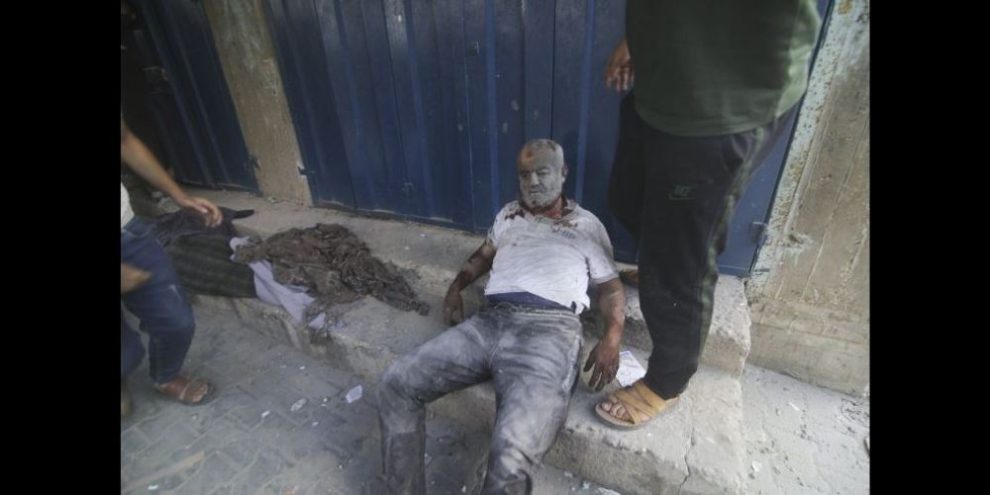
By Najib Jobain, Samya Kullab And Ravi Nessman in Khan Yunis
Israel bombed areas of southern Gaza where it had told Palestinians to flee to ahead of an expected ground invasion, killing dozens of people on Tuesday in retaliatory attacks it says are targeted at Hamas militants that rule the besieged territory.
With no water, fuel or food being delivered to Gaza since Hamas’ brutal attack on Israel last week, mediators struggled to break a deadlock over-delivering supplies to increasingly desperate civilians, aid groups and hospitals.
U.S. President Joe Biden prepared to head to the region as he and other world leaders tried to prevent the war from sparking a broader regional conflict. Violence flared Tuesday along Israel's border with Lebanon, where Iranian-backed Hezbollah militants operate.
In Gaza, dozens of injured were rushed to hospitals after heavy attacks outside the southern cities of Rafah and Khan Younis, residents reported. Basem Naim, a senior Hamas official and former health minister, reported 27 people were killed in Rafah and 30 in Khan Younis.
An Associated Press reporter saw around 50 bodies brought to Nasser Hospital in Khan Younis. Family members came to claim the bodies, wrapped in white bedsheets, some soaked in blood.
An airstrike in Deir al Balah reduced a house to rubble, killing nine members of the family living there. Three members of another family that had evacuated from Gaza City were killed in a neighbouring home. The dead included one man and 11 women and children. Witnesses said there was no warning before the strike.
The Israeli military said it was targeting Hamas hideouts, infrastructure and command centers. “When we see a target, when we see something moving that is Hamas, we’ll take care of it," Lt. Col. Richard Hecht, an Israeli military spokesman, said.
The U.N. human rights office decried “appalling reports” that civilians who were trying to flee to southern Gaza were killed by a military strike. Spokeswoman Ravina Shamdasani urged Israeli forces to avoid “aerial bombardments, indiscriminate or disproportionate attacks” and to “take precautions to avoid – and in any case, to minimize – loss of civilian life, injury to civilians and damage to civilian objects.”
Israel sealed off Gaza since the militant attack on southern Israel Oct. 7 killed over 1,400 people, mostly civilians, and resulted in some 200 taken captive in Gaza. Hamas militants in Gaza have launched rockets every day since, aiming at cities across Israel.
Israeli strikes on Gaza have killed at least 2,778 people and wounded 9,700, according to the Gaza Health Ministry. Nearly two-thirds of those killed were children, a ministry official said.
Another 1,200 people across Gaza are believed to be buried under the rubble, alive or dead, health authorities said. Emergency teams struggled to rescue people while cut off from the internet and mobile networks, running out of fuel and exposed to unceasing airstrikes.
On Monday Israeli warplanes struck the headquarters of the Civil Defense in Gaza City, killing seven paramedics. Another 16 medics and doctors have been killed on the job, Gaza officials said.
Israeli Prime Minister Benjamin Netanyahu said Tuesday that his country's retaliation against Hamas aims to eradicate the group's political and military rule over Gaza.
’’We are not fighting just our war. We’re fighting the war of all civilized countries and all civilized peoples,” he said.
Israel has massed troops at the border for an expected ground offensive, but Hecht said Tuesday no concrete decisions have been made despite Israel’s mass evacuation order for the north of the Gaza Strip.
More than 1 million Palestinians have fled their homes — roughly half of Gaza's population — and 60% are now in the approximately 14-kilometer (8-mile) long area south of the evacuation zone, the U.N. said.
Aid workers warned that the territory was near complete collapse. Hospitals were on the verge of losing electricity, threatening the lives of thousands of patients, and hundreds of thousands of people searched for bread and water.
The U.N. agency for Palestinians said more than 400,000 displaced people are crowded into schools and other facilities in the south. The agency said it has only 1 litre of water a day for each of its staff members trapped in the territory.
Israel opened a water line into the south for three hours that benefitted only 14 percent of Gaza’s population, the U.N. said.
At the Rafah crossing, Gaza’s only connection to Egypt, truckloads of aid were waiting to enter. The World Food Program said that it had more than 300 tons of food waiting to cross into Gaza.
Civilians with foreign citizenship — many of them Palestinians with dual nationalities — also waited in Rafah, desperate to get out.
“We come to the border crossing hoping that it will open, but so far there is no information,” said Jameel Abdullah, a Swedish citizen.
An agreement to open the border appeared to have been reached Monday, but Israel denied reports of a cease-fire in Rafah, which would be a precondition. On Tuesday morning, gates were still closed.
An Egyptian official said Tuesday that Egypt and Israel agreed that the aid convoys at the border would travel into Israel for inspection at the Kerem Shalom crossing between Gaza and Israel. The aid would then be allowed into Gaza. A brief humanitarian cease-fire would take place and foreign nationals would be allowed to exit Gaza via Rafah, the official said, speaking on condition of anonymity because he was not allowed to speak with the media.
Officials for Hamas and Israel cast doubt on an immediate opening, saying they were unaware of an agreement.
U.S. Secretary of State Antony Blinken, who visited Israel for the second time in a week on Monday after a six-country tour through Arab nations, said in Tel Aviv that the U.S. and Israel had agreed to develop a plan to enable humanitarian aid to reach civilians in Gaza. There were few details, but the plan would include “the possibility of creating areas to help keep civilians out of harm’s way.”
Gen. Erik Kurilla, the head of U.S. Central Command, arrived in Tel Aviv for meetings with Israeli military authorities ahead of a Biden visit planned for Wednesday to signal White House support for Israel. Biden will also travel to Jordan to meet with Arab leaders amid fears the fighting could spread in the region.
Israel evacuated towns near its northern border with Lebanon, where the military has exchanged fire repeatedly with Hezbollah militants.
Israel said it killed four militants wearing explosive vests who were attempting to cross into the country from Lebanon on Tuesday morning. Video from a reconnaissance drone the army shared showed the militants near the border wall before they were targeted, causing an explosion. No group immediately claimed responsibility.
“Whoever approaches the border with Lebanon will be killed,” said Israeli military spokesman Rear Adm. Daniel Hagari.
Israel has warned Lebanon it will strongly retaliate against attacks from across the border.
Israel fought a vicious monthlong war with Hezbollah in 2006 that ended in a stalemate and a tense detente between the two sides.
Iran’s Supreme Leader Ayatollah Ali Khamenei warned that Israel's continuing offensive in Gaza could cause a violent reaction across the region.
“Bombardments should be immediately stopped. Muslim nations are angry,” Khamenei said, according to state media.
Hamas’ military wing released a hostage video on Monday showing a dazed woman having her arm wrapped with bandages. The woman, who identified herself as Mia Schem, 21, rocked slightly as she spoke, the sound of explosions reverberating in the background.
The plight of the hostages — Hamas claims it has more than 200 of them — has dominated the Israeli media since the attack. Interviews with relatives of hostages are shown over and over on television. Israeli officials have vowed to maintain the siege of Gaza until the hostages are released.
Kullab reported from Baghdad. Nessman reported from Jerusalem. Associated Press journalists Amy Teibel in Jerusalem; Abby Sewell in Beirut; Samy Magdy and Jack Jeffrey in Cairo; and Ashraf Sweilam in el-Arish, Egypt contributed to this report
Banner image via The Associated Press





